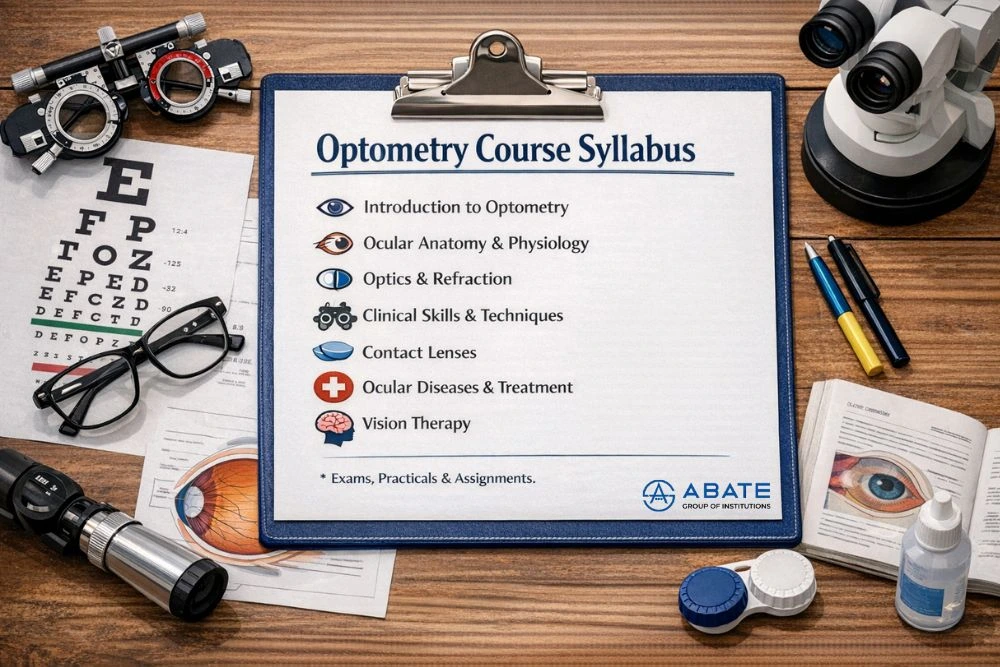After B.Sc Optometry, What Can I Do? – A Complete Guide

Choosing a career path after completing a B.Sc in Optometry can feel overwhelming, especially with so many opportunities available in the field of eye care. Optometry is one of the fastest-growing healthcare professions, and with vision problems increasing worldwide, the demand for skilled optometrists is higher than ever. If you have completed your B.Sc in Optometry and are wondering, “What next?”, this guide will help you explore your options.
1. Higher Education Opportunities
Pursuing further studies is one of the most common choices after a B.Sc in Optometry. Higher education not only expands your knowledge but also opens doors to specialized roles.
- Master of Optometry (M.Optom):
A two-year postgraduate course where you can specialize in areas like contact lenses, low vision, pediatric optometry, or clinical optometry. - Master of Science (M.Sc) in Optometry:
An alternative to M.Optom, with a strong focus on research and advanced clinical practice. - Fellowship Programs:
Short-term fellowships in subspecialties such as binocular vision, ocular disease management, or low vision aid help you gain hands-on expertise. - Ph.D. in Optometry:
For those interested in research and academic careers, pursuing a doctorate can open the way to becoming a professor, researcher, or innovator in vision science.
2. Career Opportunities in Clinical Practice
After graduation, many optometrists choose to directly enter clinical practice. With your degree, you can work in:
- Eye Hospitals and Clinics: Providing vision testing, prescribing corrective lenses, and assisting in pre- and post-operative care for patients.
- Independent Optometry Clinics: Setting up your own practice is a rewarding option for those interested in entrepreneurship.
- Multispecialty Hospitals: Joining as part of the ophthalmology department to work alongside surgeons and other specialists.
Optometry graduates are vital in detecting eye conditions like glaucoma, cataracts, and diabetic retinopathy, making clinical roles both impactful and in demand.
3. Careers in the Optical Industry
The eyewear and lens industry is another booming field for optometry graduates. Opportunities include:
- Contact Lens Specialist: Working with companies that design and supply advanced contact lenses.
- Lens Consultant: Advising optical companies on lens designs and prescriptions.
- Corporate Roles: Joining global eyewear brands in sales, training, and product development.
This career path is ideal for those who want to combine clinical knowledge with business and industry innovation.
4. Teaching and Academic Careers
If you enjoy sharing knowledge, academia can be a fulfilling path. Many optometrists go on to teach in optometry schools and colleges. With a postgraduate degree, you can become a lecturer or professor, helping train the next generation of optometrists.
5. Research Opportunities
Optometry is continuously evolving, with advancements in technology like AI-driven eye testing, smart lenses, and digital eye strain management. As a graduate, you can enter research institutions or collaborate with universities and hospitals to work on new innovations in vision care.
6. Non-Clinical Career Paths
Not all careers after the BSc Optometry course in Kerala need to be strictly clinical. Some other exciting options include:
- Public Health and Community Eye Care Programs: Working with NGOs or government initiatives to prevent blindness and promote eye health.
- Medical Writing and Consulting: Using your knowledge to create educational materials, research papers, or health content.
- Corporate Training: Joining multinational healthcare companies as a trainer for optometry-related products.
7. Entrepreneurship in Eye Care
With the growing demand for eye health services, many graduates choose entrepreneurship. Options include:
- Opening your own optometry practice.
- Starting an optical retail business.
- Offering mobile eye testing units in underserved areas.
Entrepreneurship not only gives you independence but also allows you to contribute directly to improving community vision care.
8. International Opportunities
Optometry graduates are in demand globally. Countries like the USA, Canada, Australia, and the Middle East have thriving opportunities for qualified optometrists. You may need to clear licensing exams such as the NBEO (National Board of Examiners in Optometry) in the US or meet local requirements abroad.
Conclusion
After completing a B.Sc in Optometry, you have multiple pathways—whether you want to study further, practice clinically, join the industry, research, or even start your own venture. The profession offers flexibility, growth, and the satisfaction of helping people see better every day.
For students considering a structured path forward, institutes like Abate Institute of Optometry provide advanced programs and guidance to help graduates build successful careers in this field.

